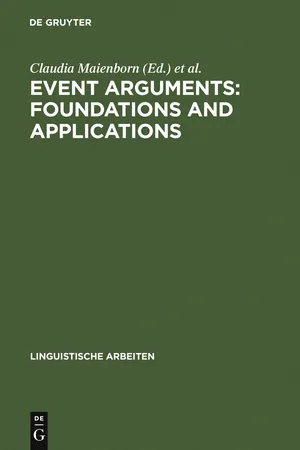
eBook - PDF
Event Arguments: Foundations and Applications
- 374 pages
- English
- PDF
- Available on iOS & Android
eBook - PDF
Event Arguments: Foundations and Applications
About this book
Since entering the stage, Davidsonian event arguments have taken on a central role in linguistic theorizing. Recent years have seen a continuous extension of possible applications for them, not only in semantics but also in syntax. At the same time questions concerning the ontological status of events have received renewed attention. This collection of articles provides new evidence for the virtually ubiquitous presence of event arguments in linguistic structure and sheds new light on their nature. The volume is organized into four sections: Events - states - causation; Event nominals; Events in composition; Measuring events.
Tools to learn more effectively

Saving Books

Keyword Search

Annotating Text

Listen to it instead
Information
Table of contents
- Introduction
- Section I: Events - states - causation
- The event structure of CAUSE and BECOME
- Stativity, supervenience, and sentential subjects
- Do states have Davidsonian arguments? Some empirical considerations
- Ser and estar: The syntax of stage level and individual level predicates in Spanish
- Sentence connection as quantificational structure
- Section II: Event nominals
- Gerund types, the present participle and patterns of derivation
- Referential arguments of nouns and verbs
- Section III: Events in composition
- Building resultatives
- Reconciling “possessor” datives and “beneficiary” datives - Towards a unified voice account of dative binding in German
- Event arguments and modal verbs
- Section IV: Measuring events
- Types of degrees and types of event structures
- Too poor to mention: Subminimal events and negative polarity items
- Semantic properties of split topicalization in German
- Author index
- Subject index
Frequently asked questions
Yes, you can cancel anytime from the Subscription tab in your account settings on the Perlego website. Your subscription will stay active until the end of your current billing period. Learn how to cancel your subscription
No, books cannot be downloaded as external files, such as PDFs, for use outside of Perlego. However, you can download books within the Perlego app for offline reading on mobile or tablet. Learn how to download books offline
Perlego offers two plans: Essential and Complete
- Essential is ideal for learners and professionals who enjoy exploring a wide range of subjects. Access the Essential Library with 800,000+ trusted titles and best-sellers across business, personal growth, and the humanities. Includes unlimited reading time and Standard Read Aloud voice.
- Complete: Perfect for advanced learners and researchers needing full, unrestricted access. Unlock 1.4M+ books across hundreds of subjects, including academic and specialized titles. The Complete Plan also includes advanced features like Premium Read Aloud and Research Assistant.
We are an online textbook subscription service, where you can get access to an entire online library for less than the price of a single book per month. With over 1 million books across 990+ topics, we’ve got you covered! Learn about our mission
Look out for the read-aloud symbol on your next book to see if you can listen to it. The read-aloud tool reads text aloud for you, highlighting the text as it is being read. You can pause it, speed it up and slow it down. Learn more about Read Aloud
Yes! You can use the Perlego app on both iOS and Android devices to read anytime, anywhere — even offline. Perfect for commutes or when you’re on the go.
Please note we cannot support devices running on iOS 13 and Android 7 or earlier. Learn more about using the app
Please note we cannot support devices running on iOS 13 and Android 7 or earlier. Learn more about using the app
Yes, you can access Event Arguments: Foundations and Applications by Claudia Maienborn, Angelika Wöllstein, Claudia Maienborn,Angelika Wöllstein in PDF and/or ePUB format, as well as other popular books in Languages & Linguistics & German Language. We have over one million books available in our catalogue for you to explore.